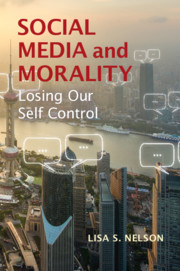Book contents
- Frontmatter
- Contents
- Introduction
- 1 The Political Significance of Social Media and the Limits of Our Understanding
- 2 The Moral Significance of Social Networking Technologies
- 3 Why We Do What We Do
- 4 Time Consciousness and the Specious Present of Social Media
- 5 Pretty Is as Pretty Does
- 6 Revealing the Moral Self in the Context of Us
- Bibliography
- Index
5 - Pretty Is as Pretty Does
Published online by Cambridge University Press: 07 June 2018
- Frontmatter
- Contents
- Introduction
- 1 The Political Significance of Social Media and the Limits of Our Understanding
- 2 The Moral Significance of Social Networking Technologies
- 3 Why We Do What We Do
- 4 Time Consciousness and the Specious Present of Social Media
- 5 Pretty Is as Pretty Does
- 6 Revealing the Moral Self in the Context of Us
- Bibliography
- Index
Summary
If someone called me a chink or a gook online I really wouldn't care at all. In real life though, depending on who says it, if someone called me a chink or gook I would want to beat the hell out of them … Reason for this is because online they have no clue what race I am and so they are obviously trying to troll me which I find funny. Real life though they are actually attacking my culture/ race which I can take until it's a friend or something (Phillips, 2015, p. 34).
If the despairing self is active … it is constantly relating to itself only experimentally, no matter what it undertakes, however great, however amazing and with whatever perseverance. It recognizes no power over itself; therefore in the final instance it lacks seriousness … The self can, at any moment, start quite arbitrarily all over again (Kierkegaard, 1941, p. 100).
The arrival of social networking technologies was met with great optimism and anticipation when it came to our personal identity. These technologies promised to us the possibility to communicate and interact free from the physical markers of gender, class, ethnicity, sexuality, and disability and, in doing so, liberate us from the ways we were divided. The hope was that realization of our transcendental self in virtual reality would allow us to prioritize the mind and not the body as the primary characteristic of being human (Yar, 2014). Yet, it seems we are even more divided and segmented than ever before, and social networking technologies might be partially to blame.
Some argue that being able to hide our identity is often at fault for all that is wrong and accounts for the increase in the bad behavior when we are on social media (Peebles, 2014). Yet, ironically, the two main arenas for our interactions and communications – social networking sites and text messages – are not anonymous environments, and studies indicate that it is here our human behavior is at its worst (Tokunaga, 2010).
- Type
- Chapter
- Information
- Social Media and MoralityLosing our Self Control, pp. 155 - 183Publisher: Cambridge University PressPrint publication year: 2018



